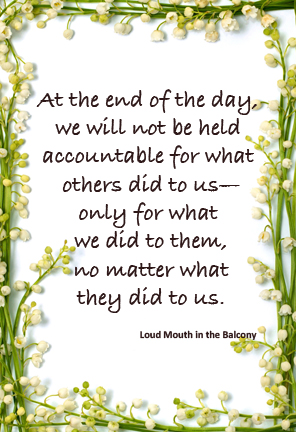Perhaps you noticed the fear-peddling headlines about the growing number of ‘lone wolf’ terrorists who have assigned themselves the duty of killing those whose behavior, looks or ideologies don’t align with theirs. I was in the news business for more than 20 years, and I confidently declare that this is not news.
The reports are focused on the past three weeks, but who are they kidding? Lone wolf terrorists have been on the prowl for centuries. Just today, thousands of these terrorists committed dehumanizing acts in homes, workplaces, churches, schools, college campuses, online–in fact, any location where at least two are gathered is susceptible to terrorist attack.
Terrorists don’t always commit murder; the overwhelming majority take pleasure in annihilating humans’ freedom of thought and movement, basic rights, or our most cherished possession: self worth. If we don’t do what they want us to do, when and how they want us to do it, they attack: verbally, physically–or my favorite, in prose.
Somewhere these folks learned that assault is an appropriate, mature, effective and transformative response to a problem; some even consider it professional. Now that’s deep.
In every case, the attackers are laser-focused on their victims, determined to force victims to conform to or comply with their wishes–or face the consequences of their wrath. This is a technique with an ancient precedent. (See my earlier post: “Solving problems by killing people: A Divine idea?”) Because they’re not looking inward, they not only lose their connection with the perfect solution, they become their own victims. In other words, the hunter gets captured by the game.
Can you remember the last time you were angry? Do you remember what it felt like: heart pounding so hard you could hear it; your armpits were dripping, and your chest felt as tight as a clenched fist. Your veins were bulging at your temples and your breathing was shallow–even the steam coming from your nostrils was in short bursts. Remember that? You kept telling yourself (and telling anyone who would listen) how furious you were, and you thought a lot about retribution–getting even, showing them what a bad idea it was to mess with you.
Science tells us that these angry feelings changed your body chemistry; you actually created harmful poisons inside you. Metaphysics suggests that your negative emotions might have even left an imprint on your soul that will come back to haunt your body in the form of disease. Anger, they say, eats up your ethereal body and creates diseases that do the same to your physical body.
Who was the real victim? And who orchestrated it all? Your ego. Heck, it was the ego who told somebody to tell you that some dude named Satan was The Enemy, and that God was in some far off place.
The ego will always tell you that whatever happened is someone else’s fault, and that you should attack. It will never mention that God is waiting peacefully within you, waiting for you to ask for a more enlightened way to solve your problems.
“The ego is master illusionist. From your birth, it diverts your attention by giving you–and this calls for a drumroll, please–problems.”
The Disappearance of the Universe, Gary R. Renard
Anger, resentment confrontation, retribution, violence are the ego’s tricks, and we fall for them every time. Our egos make us think that we’re showing others how powerful we are by verbally or physically beating up on them: “I’m mad! And I’m going to make you suffer!” In reality, we’re only beating up on ourselves. All of the negative energy we create harms our physical bodies and makes us weaker, sicker and slower to heal.
The ego also convinces us that we were right, and it gives us justification for whatever we did. Like parrots, we repeat it as if it’s true. The man who murdered the abortion doctor justified his actions, as did the young man in Alabama who fired shots at the military recruiting office and the white supremacist who killed the guard at the Holocaust Museum. In their minds, they were right–and, scary as it may seem, each believed that they honored God by killing their victims. That’s because they read somewhere that God solves problems by brutally killing people.
Our egos can only take us where we agree to go. Our egos don’t want us to remember one vitally important fact: At the end of the day, we will not be accountable for what others did to us—only for what we did to them, no matter what they did to us. And so we agree to forget.
 Every time we fixate on and react negatively or punitively to what someone else did, we jump into the ego’s trick bag, yank the drawstring and tie a knot around our necks. We deliberately inflict these wounds on ourselves and we cannot blame anyone else.
Every time we fixate on and react negatively or punitively to what someone else did, we jump into the ego’s trick bag, yank the drawstring and tie a knot around our necks. We deliberately inflict these wounds on ourselves and we cannot blame anyone else.
Life is a teacher, and it gives us numerous opportunities to become stronger than our egos. It sends negative, ego-driven people into our space to taunt and to teach. It gives us plenty of opportunities to practice neutralizing their negative energy so that it doesn’t hurt us.
The most potent neutralizer is forgiveness. Think of what a bucket of water did to the Wicked Witch of the West–an evil, power-hungry woman who stopped at nothing to get what she wanted (like some of the people we know). Forgiveness is your bucket of water. It restores the power your own ‘lone wolf terrorist’–your ego–has stripped from you.
Your ego has convinced you that forgiveness is something you give to someone else. Furthermore, it insists, you should withhold forgiveness to punish them. It’s a power trip, a survival technique. But it’s not ours; it’s the ego’s. If we forgive, our egos die, melt into nothingness like the witch.
Expect your ego to fight for survival if you start forgiving others. It will send a battalion of petty, nasty people to make you lose your cool and relinquish your power to them. Some of us actually become stronger from these challenging exercises. Others succumb and become part of the embittered battalion. We always have a choice in determining our outcome.
I have a friend who was being verbally accosted by a client, of all people. The attacks were vicious, condescending, profane and abusive. Because they were so extreme, she felt that she had to stand up for herself—even though he was a client and could impact her livelihood.
She considered giving him an earful of what he had given her. Instead, she gave me a call. If she was looking for affirmation that a good cussin’ out would neutralize this clown, she dialed the wrong number.
My response: Don’t let him blow out your Christ Light. Hold onto the Christ within you and don’t let It go. Don’t empower this man to make you act anything but Christlike. Don’t let him force you to be less than who you are.
We’re tested with scenarios such as this all the time. While walking home earlier this evening, past the Blues Fest, I saw a man jump out of his car at the intersection of Lake Shore Drive and Monroe, and accost the man in the car behind him. First, the attack was verbal; then he began to punch the driver through his open window. A second man jumped out of the car in front and joined the attack as about a dozen of us watched, speechless.
My eyes darted about, surveying the surrounding area for shelter, just in case one of the fools had a gun. In all these years, I had never noticed that the boathouse was so dangerously far away from the curb.
It was one of those “Forgive them, Father, for they know not what they do (to themselves)” moments. Most times, we allow the darkness to overpower us because we’ve lost sight of our Light. We forgot that light and darkness cannot occupy the same space at the same time. The only way to remember is to practice, practice, practice until it becomes an instinct to see and to be the Light within. Once we’ve grasped that, instead of falling into someone’s dark vortex, we will instinctively forgive them, no matter what they do.
Forgiveness is not for the weak. Like everything that benefits us, like exercise and healthy eating, it requires a strong resolve–and lots and lots of practice. But you can do it, if you really want a more joyful life.
I was speaking with a colleague the other day, and she surprised me by mentioning that she seeks inspiration on my www.dramaqueenworkshops.com website when she encounters negativity. On that particular day, she had also downloaded a Forgiveness Coupon from the site, and she said that it instantly empowered her.
I invite you to do the same. Forgiveness Coupons will fully support your practice. They are totally free and absolutely priceless. As indicated on each coupon, they are also fully transferable and duplication is highly encouraged (or simply download more). And, did I mention: They never expire.






